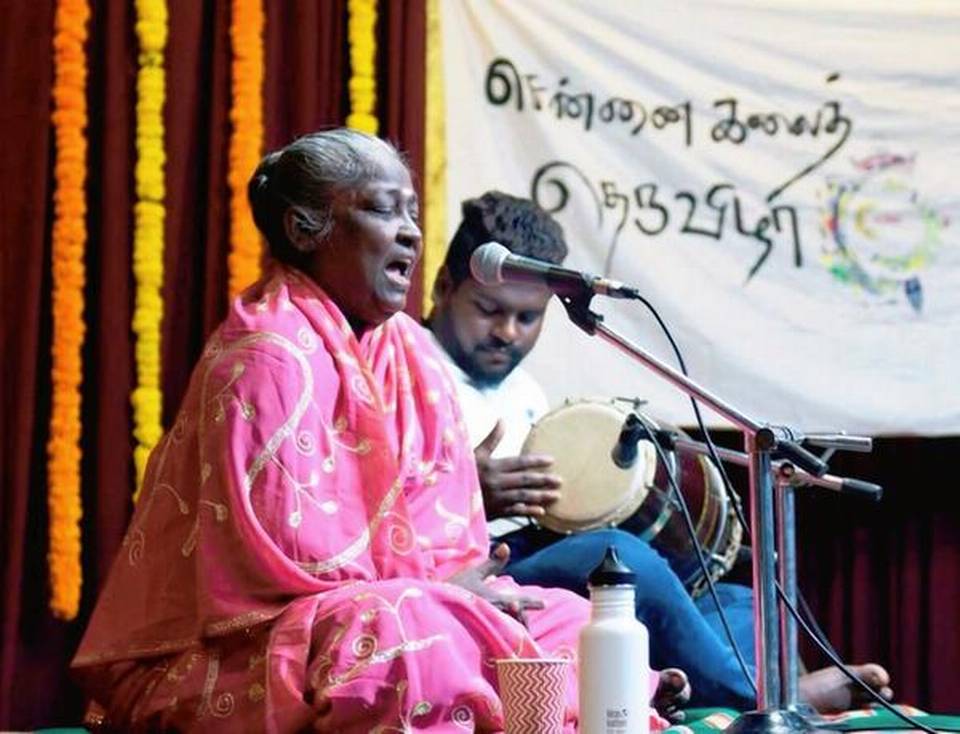She sings at home, for family, at funerals… ‘Vyasarpadi’ Muniammal is among the few women gaana singers in the city
‘Vyasarpadi’ Muniammal sings about her dead husband in a deep voice. “Nee irandha podhum unai marakka mudiyuma… (How can I forget you once you’re gone?)”
She emphasises each word, sounding matter-of-fact and pained at the same time. Listening to her is like eavesdropping on a conversation she’s having with her husband. But the melancholic tune reminds us that it’s a song, after all. Gaana is like that: deeply personal, and yet, universal.
Muniammal recently performed at Raga Sudha Hall, Mylapore, as part of Chennai Kalai Theru Vizha. She is upbeat that she got a platform to perform — it was her first stage. But little has changed in her life.
She has now gone back to her world, eking out a living from the little she makes by singing at funerals. The 52-year-old lives in a Housing Board tenement at Udhaya Suriya Nagar, Vyasarpadi. “I’ve been singing since I was eight years old,” says Muniammal. “My father Kanthayyan and my brothers kept singing at our home in Chetty Thottam, Royapuram, all the time,” she says. “He played the jamuki, a string instrument fashioned out of a molam and sang at happy and sad events.”
Muniammal learned to sing by simply listening to the men sing. She was neither trained nor encouraged. “During her time, it was taboo for women to sing gaana at public events,” explains her nephew ‘Gaana’ Muthu, who’s part of The Casteless Collective band. “But there are so many women who sing gaana in North Chennai. They sing at home, at family events… it’s only recently, after the exposure filmmaker Pa Ranjith gave to the art form, that more and more women are coming forward,” he adds.
A day in her life
Muniammal spends her free time sitting outside her building with women from the neighbourhood. She’s known to be tough, especially during arguments that come her way. And her booming voice flies beyond several streets; it’s among her biggest assets. “I often sing while I’m at home by myself,” she says. She has three children, who sometimes contribute to her financial needs. Mostly, though, she struggles. “Since most funerals I sing at are for people I know, I cannot expect to be paid. Sometimes I am, but it’s not a lot,” she says. Her music transforms her into a completely different person. “I never sang gaana for my husband,” she says, “He liked romantic film songs.” Muniammal’s husband died four years ago; he worked at the Koyambedu vegetable market.
On nights he was drunk, he requested that she sing for him. “I sang the kind of songs he liked,” recalls Muniammal. He too, like her father, didn’t encourage her to sing outside. And so she only did so in groups, at funerals of relatives, letting her voice mingle with many others.
Her songs are from her life — she sings about the mosquito menace in her area, about her children… at funerals, she notes down the name of the deceased and incorporates it in her gaana. Muthu says that by singing at funerals, the singers aid in mourning. “It helps people cry away their sorrow,” he adds.
But in doing so, the singer too, ends up grieving. In her mind, she believes that she’s lost someone close to her. This is an unwritten rule in gaana. Says Muniammal, “I cry all the time when I sing at funerals.”
source: http://www.thehindu.com / The Hindu / Home> Society> Faith> History & Culture / by Akila Kannandasan / January 30th, 2019
